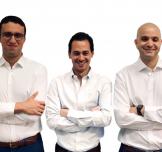Cairo: A Legacy of Entrepreneurship (Part 2)

This article is part of the #urbaneconomies series originally published on progrss and commissioned by district coworking space.
Although the close association between tech and entrepreneurship is part of a larger global trend, it is no surprise that tech takes the cake when it comes to attractiveness to both entrepreneurs and investors in Egypt. Around the world, success stories like Facebook, e-Bay, and Amazon, and more recently, Uber and Airbnb, have inspired tech-savvy youth to take the plunge. International media coverage of these businesses and their founders have made for inspirational personal stories that digitally-native young Egyptians would seek to emulate (one interviewee reported a business plan competition contestant referring to Facebook founder Mark Zuckerberg as “Mark” when describing his social media platform).othe
And indeed, both the public and private sector have invested heavily in tech over the past 10 years; between 2005 and 2013, the number of ICT companies increased from 1,716 to 5,559 and ICT revenues tripled from U.S $25 billion to $75 billion – with most of those revenues coming from the offshoring industry. ICT 2020 – the government’s medium-term strategy for the ICT sector – will see EGP 124.8 billion (US $17 billion) injected into the sector over the next six years, with the objective of more than doubling ICT as a share of GDP during that time (ICT represented just 4.1% of GDP in 2015). In the meantime, the rate of internet penetration – which almost doubled from 16 million users in 2009 to almost 31 million in 2016 – indicates that access to tech, like tech, is changing fast.
Experts elsewhere have indicated that tech – and the unprecedented scope, scale and economic impact of technology as a disruptive force in human history – is one of just four global forces defining what the future will look like, which explains why so many are looking to the industry. In many ways, tech today is doing what global trade did for sixteenth-century merchants like Abu Taqiyya. According to Tarek Assaad, Managing Partner at Ideavelopers – a venture capital firm that invests in early-stage tech startups – technology is attractive because of its scalability as well as its potential to address developmental problems. He explains that, while a lot remains to be done, the opportunities abound for tech entrepreneurs. “Egypt has a way to go and we can move the needle on a little of critical issues.”
According to entrepreneur Hashem El Dandarawy, the primary reason that so many youths, who have little to lose but their time, turn to tech entrepreneurship is the low barrier to entry (the UNDP puts youth unemployment at 34%). El Dandarawy began his career as a rice trader in East Africa before returning to Egypt to work in agricultural development and later established K-9 Sense – a company that provides products and services for the training and care of canines.
Sitting on the 10-acre suburban property that houses his kennel Eastwind, he discusses some of the challenges of perceiving entrepreneurship through the narrow lens of tech. According to him, the emphasis on tech entrepreneurship is partially the result of a “theme of success” associated with tech in Europe and the U.S., which, while valuable, does not always address local challenges. The Upper Egyptian, who owns the educational NGO Dandara Cultural Center, which has 64 centers in Upper Egypt, speaks of the need for a more accessible vocabulary that is better suited to local needs.
“If you want to support entrepreneurs, define entrepreneurship using a common word that the person on the street will understand. But the word riyyadet el a’mal is Chinese – it doesn’t mean anything to a lot of people. When you bring it down to a digestible vocabulary and show me what you mean, people can get behind it,” he says.
The owner of The Courtyard and CEO of Misr Contracting Company Mohamed El Sawy agrees with him, noting that: “It’s all well and good that people are calling themselves entrepreneurs, but we’re still talking about a very specific socioeconomic class that understands this terminology. If you talk about the majority of the population, they have no idea what you’re talking about.”
Others note that entrepreneurs in Egypt abound – although most of them can be found plying the parallel or informal market for opportunities, and rarely do they call themselves entrepreneurs. According to management consultant-turned-entrepreneur and co-founder of price comparison site Yaoota Mohamed Ewis, entrepreneurship in the informal sector is immeasurable, making any attempts to quantify or understand the entrepreneurial capacity on the ground practically impossible. “I’m convinced that anything innovative that is happening is something that you and I have not heard about. You have people roaming the streets with merchandise while we sit here in an overhyped bubble. This idea that software eats the world just does not apply to Egypt,” he says as he sits at his desk in the GrEEK Campus. Ewis’ statements ring true when put in the context of a 2014 study that estimated that Egypt’s informal economy was worth up to 70% of the formal economy “with a value as high as EGP 1.5 trillion (US $204.5 billion).”
“Very few businesses solve the country’s structural problems. Nobody innovates the last mile fulfillment. Even Bey2ollak, which people raved about as a success story for years became obsolete the minute Google turned on their traffic button,” he adds. (Bey2ollak, a crowd-sourced traffic app that has been hailed as a success story for years, is searching for new strategies to stay relevant in a fast-changing market).
Indeed, according to third generation entrepreneur and CEO of Lotfy footwear Bassem Lotfy, the sheer size of the parallel market (and the complete lack of controls on it), is the reason that many formal businesses are floundering; and with so many businesses (and business owners) choosing to stay “invisible” to evade taxes and forego government bureaucracy, it is no surprise that so many non-tech entrepreneurs remain largely unknown. “I met a businessman who has a number of different factories that make everything from PVC to shoes. He’s a very successful entrepreneur, but he’s invisible. His factories are registered but his sales are off the books,” says Lotfy.
Lotfy explains that, when his grandfather founded Lotfy in the 1950s, the business was more about making shoes and less about branding. “My grandfather made shoes for regular people and for the military, and it wasn’t until my father came along that he built it into a brand and developed Coochi.” Since then, Coochi – a popular brand of sneakers made by Lotfy – has entered into common parlance as the word that people use to refer to sneakers in general.
More importantly, the story of the 10-year-old boy who jumped on a train to the capital and built a shoe empire that still lives on demonstrates once again how entrepreneurship has deep and meaningful roots that pre-date the words that we use to refer to it today.
Stay tuned for the second article in the #urbaneconomies series.
This article is brought to you by 



































































EgyptInnovate site is not responsible for the content of the comments